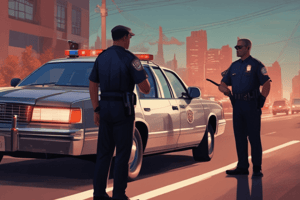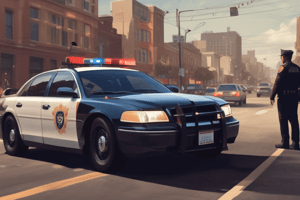Podcast
Questions and Answers
What should drivers and passengers do when observing emergency lights during a traffic stop?
What should drivers and passengers do when observing emergency lights during a traffic stop?
- Exit the vehicle immediately
- Start recording the interaction on their phone
- Refuse to lower the window
- Turn off the engine and audio devices (correct)
What should individuals do if they disagree with the officer's decision during a traffic stop?
What should individuals do if they disagree with the officer's decision during a traffic stop?
- Contest the decision in court through legal channels (correct)
- Immediately drive away from the scene
- Refuse to cooperate with the officer's instructions
- Verbally argue with the officer at the scene
What should individuals do if they have questions during a traffic stop?
What should individuals do if they have questions during a traffic stop?
- Immediately request to speak to a supervisor
- Ask the officer to clarify if questions arise (correct)
- Remain silent and refuse to ask any questions
- Ignore any confusion and follow the officer's instructions
What should individuals do if the officer acted inappropriately during a traffic stop?
What should individuals do if the officer acted inappropriately during a traffic stop?
When should individuals inform the officer of any weapon presence during a traffic stop?
When should individuals inform the officer of any weapon presence during a traffic stop?
What documents do officers typically ask for during a traffic stop?
What documents do officers typically ask for during a traffic stop?
What is the primary purpose of traffic laws?
What is the primary purpose of traffic laws?
Why is it important to obey traffic laws?
Why is it important to obey traffic laws?
How do traffic laws contribute to public safety?
How do traffic laws contribute to public safety?
Which of the following is NOT a potential consequence of failing to obey traffic laws?
Which of the following is NOT a potential consequence of failing to obey traffic laws?
What is the main purpose of traffic laws in relation to preventing crashes?
What is the main purpose of traffic laws in relation to preventing crashes?
In what way do traffic laws contribute to public safety?
In what way do traffic laws contribute to public safety?
Flashcards are hidden until you start studying
Study Notes
Traffic Stops
- When observing emergency lights during a traffic stop, drivers and passengers should remain calm, stay in their vehicle, and keep their hands visible.
- If individuals disagree with the officer's decision, they should remain calm and respectful, and avoid arguing or becoming aggressive.
Interacting with Officers
- If individuals have questions during a traffic stop, they should ask the officer politely and respectfully.
- If the officer acts inappropriately, individuals should remain calm and report the incident to the officer's supervisor or file a complaint.
Safety Precautions
- Individuals should inform the officer of any weapon presence during a traffic stop, and follow the officer's instructions carefully.
- Officers typically ask for a driver's license, vehicle registration, and proof of insurance during a traffic stop.
Traffic Laws
Purpose and Importance
- The primary purpose of traffic laws is to regulate traffic flow, prevent crashes, and ensure public safety.
- It is important to obey traffic laws because they help maintain order, prevent accidents, and reduce injuries and fatalities.
Contribution to Public Safety
- Traffic laws contribute to public safety by reducing the risk of accidents, promoting responsible driving practices, and maintaining a safe environment for all road users.
Consequences of Non-Compliance
- Failing to obey traffic laws can result in fines, license suspension, increased insurance rates, and even criminal charges.
- Not obeying traffic laws can lead to accidents, injuries, and fatalities.
Preventing Crashes
- The main purpose of traffic laws is to prevent crashes by regulating speed, promoting responsible driving practices, and ensuring road safety.
- Traffic laws help prevent crashes by setting standards for safe driving, vehicle maintenance, and road infrastructure.
Studying That Suits You
Use AI to generate personalized quizzes and flashcards to suit your learning preferences.




